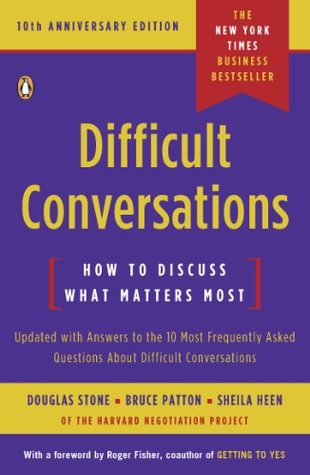More on this book
Community
Kindle Notes & Highlights
Read between
October 10 - October 12, 2020
Despite what we sometimes pretend, our initial purpose for having a difficult conversation is often to prove a point, to give them a piece of our mind, or to get them to do or be what we want. In other words, to deliver a message.
Arguing creates another problem in difficult conversations: it inhibits change. Telling someone to change makes it less rather than more likely that they will. This is because people almost never change without first feeling understood.
It may be that as you share them, your stories change in response to new information or different perspectives. But they still may not end up the same, and that’s all right. Sometimes people have honest disagreements, but even so, the most useful question is not “Who’s right?” but “Now that we really understand each other, what’s a good way to manage this problem?”
When we’re the ones acting, we know that much of the time we don’t intend to annoy, offend, or upstage others. We’re wrapped up in our own worries, and are often unaware that we’re having any negative impact on others. When we’re the ones acted upon, however, our story too easily slides into one about bad intentions and bad character.
Most of us assume that knowing how we feel is no more complicated than knowing whether we are hot or cold. We just know. But in fact, we often don’t know how we feel.
One assumption many of us incorporate into our footprint is the assumption that there is something inherently wrong with having feelings.
A second assumption many of us incorporate into our footprint is that there are certain emotions “good people” should never feel: good people don’t get angry at people they love, they don’t cry, they don’t fail, and they are never a burden.
There are probably as many identities as there are people. But three identity issues seem particularly common, and often underlie what concerns us most during difficult conversations: Am I competent? Am I a good person? Am I worthy of love?
Once you’ve identified which aspects of your identity are most important to you or seem most vulnerable, you can begin to complexify your self-image. This means moving away from the false choice between “I am perfect” and “I am worthless,” and trying to get as clear a picture as you can about what is actually true about you.
No one is always anything. We each exhibit a constellation of qualities, positive and negative, and constantly grapple with how to respond to the complicated situations life presents. And we don’t always respond as competently or compassionately as we’d like.
you cannot always make a relationship more comfortable or more nourishing or more intimate or more durable. The best you can do is try.
You are an expert on what you think, how you feel, and why you’ve come to this place. If you think it or feel it, you are entitled to say it, and no one can legitimately contradict you. You only get in trouble if you try to assert what you are not the final authority on — who is right, who intended what, what happened.


